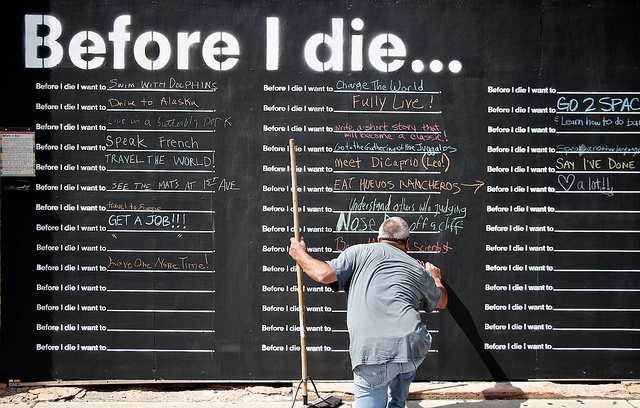
This weeks fabulous and thought-provoking guest blog post comes from Mandy Hu (aka Xian Hu) who studied Neurobiology at the University of Amsterdam and majored in Science Communication. Who she is? A writer, a traveller and a dreamer. She is still searching for her voice in science writing, but to get an idea of her writing style you can take a look at her travel blog.
Why facing death makes us want to live.
A lazy Sunday afternoon spread out on the couch with one of my top-10 films: ‘The Bucket List’. A fascinating tale about two terminal cancer patients who decide to do what they have always wanted in life. Beautiful and inspiring. But why now, in their autumn years when facing the end, did these men decide to chase after their dreams?
In the ‘Top 5 regrets of dying’ Australian caregiver Bronnie Wares takes us on a journey which reveals that the most common regret people have at the end of their lives is captured in the following phrase:
‘I wish I’d had the courage to live a life true to myself, not the life others expected of me’.
Why don’t we more often do what we truly want? What holds us back? And why is a near-death-experience or a terminal disease a wake-up call to start living?
Everyone wants to be happy
What is more important than happiness? Status? Money? Looks?
In his book ‘Psychology of Happiness’ Michael Argyle concludes from research conducted in America that happiness and living a meaningful life were esteemed as more important than money, moral goodness and more even than going to heaven. This is in line with a study in England where researchers found that happiness was rated as more important than money, health and sex.
So it has been scientifically proven that most people want to be happy.The question remains: why do so few try to be?
Fear for failure
An answer may be found in our brain which is shaped by evolution to be risk-aversive. Research on money-bets has shown that positive emotions associated with winning money is less strong than negative emotions accompanied with losing that same amount. So people are rather safe than sorry.
How does this relate to our inability to be happy?
We do not dare to chase our dreams if this means risking our familiar and safe existence. Fear for change and failure are the main barriers that keep people from achieving what they truly want.
Facing death
You must have heard them: stories of terminal patients or people with near-death experiences whose diagnosis or trauma has made them appreciate life more and encouraged them to make life changing decisions.
So why do these direct encounters with death impact life views?
According to Vail and others we all have a coping mechanism to deal with inevitable death. For most people these death thoughts are nonconscious and they are dealt with by seeking self-esteem through ‘extrinsic goals’, meaning culturally imposed standards of worth including wealth, fame and physical attractiveness.
When people are directly confronted with mortality, such as a severe illness or a near-death experience, the former coping-mechanism of extrinsic goals breaks down. Through efforts to rebuilt their coping-strategy people re-evaluate their status-orientated goals and shift toward more ‘intrinsic goals’, such as pursuit of personal growth and insight and positive interpersonal relationships. This ultimately leads to a more meaningful, more positive and better life (Vail et al 2012, When Death is Good for Life Considering the Positive Trajectories of Terror Management. Personality and Social Psychology Review).
In ‘The Bucket List’ Carter Chambers discovers the importance of pursuing his dreams in the last months of his life. In his farewell letter he writes to Edward Cole to ‘find the joy in his life’.
Truth is, you, me, we are all facing death.
Do you want to wait until the end to realise you’ve wasted most of your life? That’s what I thought.
So find the joy in your life – now.
Image credit: https://www.flickr.com/photos/clintw/
Share the love
[Sassy_Social_Share]
3 Comments
Leave a Comment
About Dr Sarah
Neuroscientist, Author, Speaker, Director of The Neuroscience Academy suite of professional training programs.
Latest Posts
Free 10 day micro-training in neuroscience

Learn one neuroscience concept a day!
10 simple, bite-sized lessons in brain health, delivered daily to your inbox


Hey, great article. I read something similar where ex health advisor to Barak Obama, Dr.Ezekiel Emanuel argues that when we reach a certain age (in his case he believes this age to be 75), that we should cease medical intervention to prolong our life. It’s not the gloomy story it sounds like, but moreover, it is to get us think more about the life we lead up until the time of our death. So, in his view it is not just about a long life, but a life of quality and if his years passed 75 are no longer of quality then he feels nature should just take it’s course. His is a controversial view but really it’s about opening up a dialogue on how well we live our lives.
I love your website… always a good read.
75!? I’m hoping I’ll get to at least 95 before I need to start considering it that way!
I completely agree – we need to be able to discuss these things.
Thanks for reading 🙂
Interesting view indeed! I can’t help but somewhat agree with Dr. Emanual… 😛 Thanks for commenting, Julie 🙂